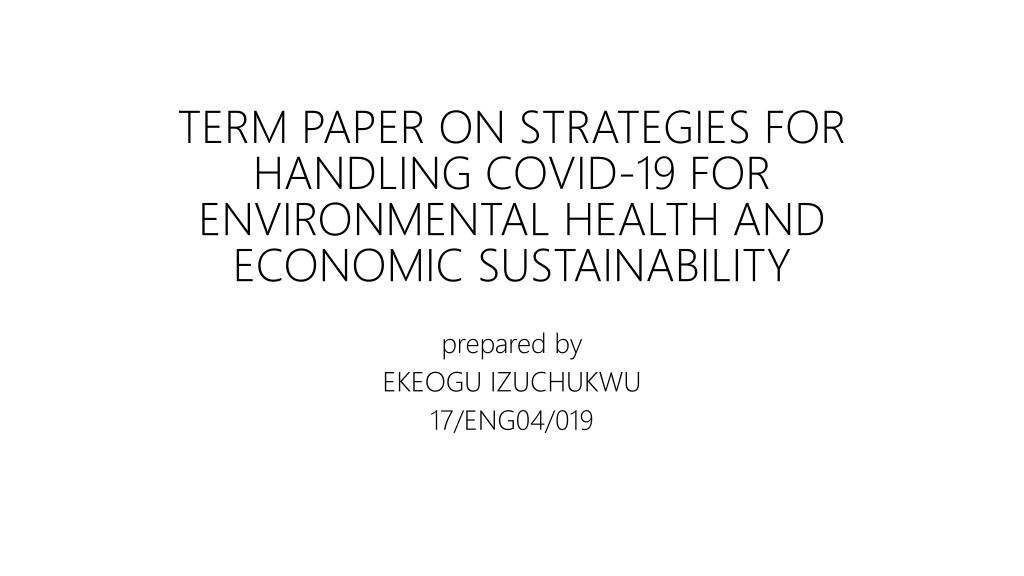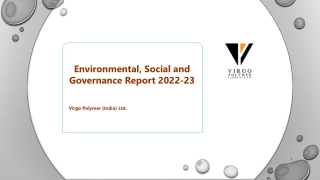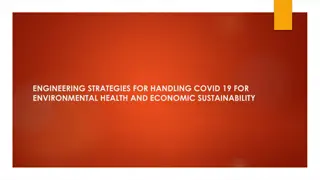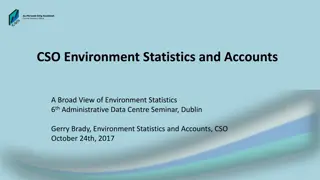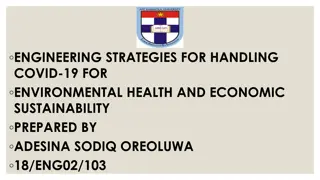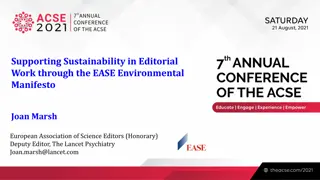Strategies for Handling COVID-19 for Environmental Health and Economic Sustainability
COVID-19, caused by the SARS-CoV-2 virus, has led to a global pandemic with various signs and symptoms, prevention techniques, and strategies for reducing its spread nationwide. Key efforts include social distancing, hand hygiene, and staying home when sick, aiming to protect public health and sustain economic stability while maintaining environmental health.
Download Presentation

Please find below an Image/Link to download the presentation.
The content on the website is provided AS IS for your information and personal use only. It may not be sold, licensed, or shared on other websites without obtaining consent from the author. Download presentation by click this link. If you encounter any issues during the download, it is possible that the publisher has removed the file from their server.
E N D
Presentation Transcript
TERM PAPER ON STRATEGIES FOR HANDLING COVID-19 FOR ENVIRONMENTAL HEALTH AND ECONOMIC SUSTAINABILITY prepared by EKEOGU IZUCHUKWU 17/ENG04/019
Firstly, what is COVID-19? Corona viruses are a family of viruses that can cause illnesses such as the common cold, severe acute respiratory syndrome (SARS) and Middle East respiratory syndrome (MERS). In 2019, a new corona virus was identified as the cause of a disease outbreak that originated in China.The virus is now known as the severe acute respiratory syndrome corona virus 2 (SARS-CoV-2). The disease it causes is called corona virus disease 2019 (COVID-19).
Signs and Symptoms Fever Cough Shortness of breath or difficulty breathing Other symptoms can include: Tiredness Aches Runny nose Sore throat
Those infected with the virus may be asymptomatic or develop flu-like symptoms, including fever, cough, fatigue, and shortness of breath. Emergency symptoms include difficulty breathing, persistent chest pain or pressure, confusion, difficulty waking, and bluish face or lips; immediate medical attention is advised if these symptoms are present. Less commonly, upper respiratory symptoms, such as sneezing, runny nose, or sore throat may be seen. Symptoms such as nausea, vomiting, and diarrhea have been observed in varying percentages. Some cases in China initially presented only with chest tightness and palpitations.
Prevention techniques Avoid large events and mass gatherings. Avoid close contact (within about 6 feet, or 2 meters) with anyone who is sick or has symptoms. Keep distance between yourself and others if COVID-19 is spreading in your community, especially if you have a higher risk of serious illness. Wash your hands often with soap and water for at least 20 seconds, or use an alcohol-based hand sanitizer that contains at least 60% alcohol. Cover your mouth and nose with your elbow or a tissue when you cough or sneeze. Throw away the used tissue. Avoid touching your eyes, nose and mouth. Avoid sharing dishes, glasses, bedding and other household items if you're sick. Clean and disinfect high-touch surfaces daily. Stay home from work, school and public areas if you're sick, unless you're going to get medical care. Avoid taking public transportation if you're sick.
STRATEGIES EMPLOYED THAT COULD REDUCE THE SPREAD OF THE VIRUS NATIONWIDE Implementation of stay at home policy. Observation of social distancing at -home -work -schools
EFFECT OF CORONA VIRUS WORLD ECONOMIES The 2019 20 coronavirus pandemic has had far-reaching consequences beyond the spread of the disease and efforts to quarantine it. As the pandemic has spread around the globe, concerns have shifted from supply-side manufacturing issues to decreased business in the services sector. Supply shortages are expected to affect a number of sectors due to panic buying, increased usage of goods to fight the pandemic, and disruption to factories and logistics in mainland China, in addition, it also led to price gouging. There have been widespread reports of supply shortages of pharmaceuticals, with many areas seeing panic buying and consequent shortages of food and other essential grocery items. The technology industry, in particular, has been warning about delays to shipments of electronic goods.
Low income individuals are more likely to contract the coronavirus and to die from it. In both New York City and Barcelona, low income neighborhoods are disproportionately hit by coronavirus cases. Hypotheses for why this is the case include that poorer families are more likely to live in crowded housing and work in the low skill jobs, such as supermarkets and elder care, which are deemed essential during the crisis. In the United States, millions of low-income people may lack access to health care due to being uninsured or underinsured. Many low income workers in service jobs have become unemployed. Coronavirus recession refers to an economic recession which may happen across the world economy in 2020 due to the 2019 20 coronavirus pandemic.
